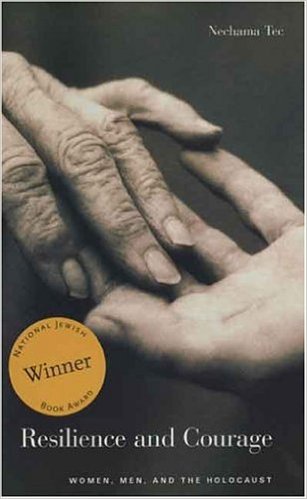
Resilience and Courage: Women, Men, and The Holocaust
Sunday to Thursday: 09:00-17:00
Fridays and Holiday eves: 09:00-14:00
Yad Vashem is closed on Saturdays and all Jewish Holidays.
Entrance to the Holocaust History Museum is not permitted for children under the age of 10. Babies in strollers or carriers will not be permitted to enter.

Resilience and Courage: Women, Men, and The Holocaust
Resilience and Courage: Women, Men, and The Holocaust
Nechama Tec
Yale University Press, 2003
438 pages
Did Jewish men and women experience the Holocaust in different ways? Did female Jewish prisoners suffer more than their male counterparts? These questions have not received adequate scholarly attention over the last thirty or forty years. However, Holocaust researchers have become increasingly involved in answering them, and they now hold great interest among the academies and the general public.
Nechama Tec's book examines how Jews during the Holocaust tried to be inventive, and struggle to live. Tec's book also examines issues of gender vis-a-vis Jewish suffering. Tec's book exposes a relatively unexplored area, suggesting that there are areas of Holocaust research that have not been exhausted, especially in the realms of sociology and psychology. In particular, Tec points out the necessity of an interdisciplinary, rather than a purely historical, approach to Holocaust research.
For the purposes of her research, Tec interviewed tens of male and female survivors, examined archival documents and read written testimonies and diverse secondary sources. Tec's research results in a book that explains, with remarkable fluency and clarity, the human processes that produced the Jewish response to genocide and annihilation. Tec finds notable differences in the patterns of response and the behavior of Jewish men and women during the Holocaust.
Nechama Tec, a professor of sociology from the University of Connecticut, has authored a number of books that have earned a fine reputation, and many of them have been translated into Hebrew (published by Yad Vashem). Tec believes that an examination of the differences in responses of Jewish men and women in the Holocaust is significant, since analysis of these differences may provide an additional tool with which to come to a deeper understanding of Jewish responses in the Holocaust in general. Tec, in the eight chapters of her recent book, approaches her research from different points of view: life in the ghetto, leaving the ghetto, life in the concentration camps, life in hiding and subsistence in the Christian world, and the resistance movements.
Since Nechama Tec is a sociologist and a Holocaust survivor, she is able to examine the various responses of Jewish individuals to the Holocaust with a scientitic, but also extremely empathetic and sensitive approach. Tec does not resort to artificial intellectualizations, nor does she presume to judge or moralize, and she succeeds at avoiding absolute conclusions.
Tec understands the importance of verbal testimony in understanding Jewish responses during the Holocaust. The era of gathering testimonies from Holocaust survivors is coming to an end, unfortunately, and Tec has therefore made concerted efforts to reach tens of survivors (many of them in Israel). She repeatedly stresses the importance of oral history.
In an attractive and gripping style, Nechama Tec attempts to understand what drove women or men to respond in the ways they did, how men and women bore physical and mental suffering, and how men and women clung to their humanity and dignity. Tec's work is not a Gender Studies or feminist essay, according to liberal sociological definitions. It is, rather, a treatment of feminist issues at the level of research. An investigation of the differences between the sexes enables a deeper understanding of the behavior of all Jewish victims in the Holocaust, and gives readers a closer acquaintance with sociological study of the patterns of response of Jewish men and women.
In her article about Tec's book, Professor Judith Tydor Baumel writes that, "Resilience and Courage is not only the name of the book, but are also characteristic of the author." It is easy to concur with Professor Baumel's characterization. Nechama Tec's books on the Holocaust are always surprising and innovative in their presentation of refreshingly original research.

Thank you for registering to receive information from Yad Vashem.
You will receive periodic updates regarding recent events, publications and new initiatives.

"The work of Yad Vashem is critical and necessary to remind the world of the consequences of hate"
Paul Daly
#GivingTuesday
Donate to Educate Against Hate


Worldwide antisemitism is on the rise.
At Yad Vashem, we strive to make the world a better place by combating antisemitism through teacher training, international lectures and workshops and online courses.
We need you to partner with us in this vital mission to #EducateAgainstHate
The good news:
The Yad Vashem website had recently undergone a major upgrade!
The less good news:
The page you are looking for has apparently been moved.
We are therefore redirecting you to what we hope will be a useful landing page.
For any questions/clarifications/problems, please contact: webmaster@yadvashem.org.il
Press the X button to continue



